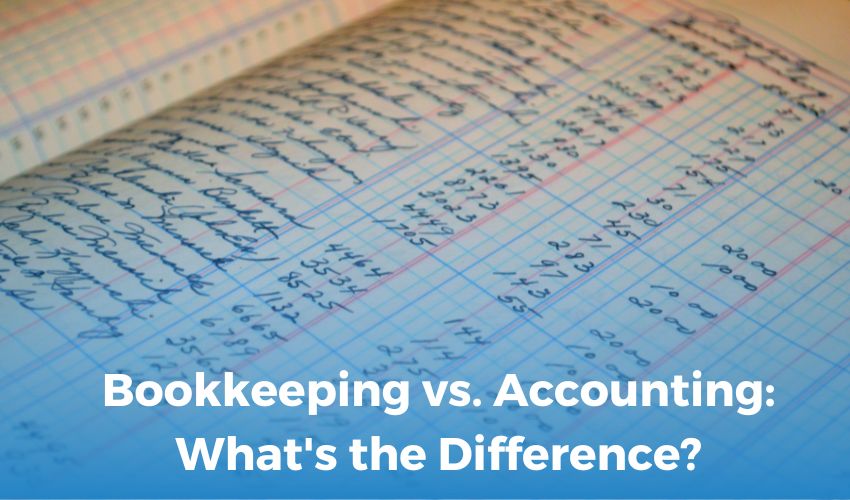

16-08-23
Bookkeeping is the systematic recording of financial transactions. It ensures that every sale, purchase, expense, and payment is accurately logged, categorized, and organized. Bookkeeping acts as the backbone of financial management, providing the raw data required for deeper financial analysis.
Bookkeepers handle daily financial tasks, such as:
Recording Transactions – Accurately tracking income, expenses, and business transactions.
Managing Payroll – Processing employee wages, tax deductions, and benefits.
Invoicing & Payments – Creating and managing invoices, as well as ensuring timely vendor payments.
Bill Payments – Tracking and ensuring that utility, rent, and other recurring payments are processed.
Bank Reconciliation – Comparing company records with bank statements to detect errors or fraud.
Bookkeepers leverage cloud-based accounting software like QuickBooks, Xero, and FreshBooks to automate record-keeping, improving efficiency and accuracy.
Accounting goes beyond bookkeeping by analyzing financial data, preparing reports, and helping businesses make informed financial decisions. Accountants interpret the information recorded by bookkeepers to assess the company’s financial health and guide strategic planning.
Accountants play a crucial role in financial planning and compliance:
Financial Analysis – Evaluating trends, identifying strengths and weaknesses, and assessing profitability.
Tax Planning & Compliance – Preparing and filing business tax returns while ensuring compliance with tax laws.
Budgeting & Forecasting – Helping businesses allocate resources efficiently and plan for future growth.
Strategic Decision-Making – Advising business owners on financial strategies to maximize revenue and cut costs.
Auditing & Risk Management – Identifying financial risks and ensuring accurate financial reporting.
| Feature | Bookkeeping | Accounting |
|---|---|---|
| Purpose | Recording daily financial transactions | Analyzing, interpreting, and strategizing financial data |
| Focus | Transaction management & financial accuracy | Business financial planning & decision-making |
| Key Tasks | Recording sales, expenses, invoices, and payments | Preparing financial reports, tax planning, and forecasting |
| Tools Used | QuickBooks, Xero, FreshBooks | Advanced financial modeling and tax software |
| Professionals | Bookkeepers | Accountants & CPAs |
For a business to be financially sound, bookkeeping and accounting must work together. Bookkeeping ensures that financial records are accurate, while accounting interprets this data to drive business decisions.
Without proper bookkeeping, accounting would be unreliable. Without accounting, bookkeeping lacks strategic direction.
This is where 360 Accounting Pro Inc. comes in. Our expert team offers comprehensive bookkeeping and accounting services, ensuring that your financial records are accurate and your business decisions are backed by reliable data.
At 360 Accounting Pro Inc., we provide a full suite of bookkeeping and accounting solutions tailored to your business needs.
Recording daily financial transactions
Bank and credit card reconciliations
Payroll processing
Accounts payable & receivable management
Financial statement preparation
Financial analysis & strategic planning
Tax preparation & compliance
Budget forecasting & business growth strategies
Risk management & auditing
Accuracy & Compliance – Ensure all financial records align with IRS tax regulations.
Time Savings – Focus on growing your business while we handle your finances.
Financial Insights – Get expert financial advice to improve profitability.
Scalable Solutions – Whether you're a startup or a growing enterprise, our services evolve with your needs.
Understanding how bookkeeping differs from accounting is crucial for business success. While bookkeeping keeps your financial records organized, accounting helps you make sense of those records and plan for the future.
By outsourcing your bookkeeping and accounting to 360 Accounting Pro Inc., you can ensure financial accuracy, stay tax compliant, and gain strategic insights to grow your business.
Ready to simplify your financial management? Contact us today for a free consultation!
The Ultimate Guide to Outsourcing Bookkeeping Services
How Small Business Owners Can Maximize Savings and Minimize Tax Burden
Top 5 Benefits of Professional Bookkeeping for Small Businesses
Tags :













































.jpg)
.jpg)
.jpg)
.jpg)


).jpg)














 Get A Quote
Get A Quote
Leave A Comment